Unlocking Personalized Support Potential Through AI
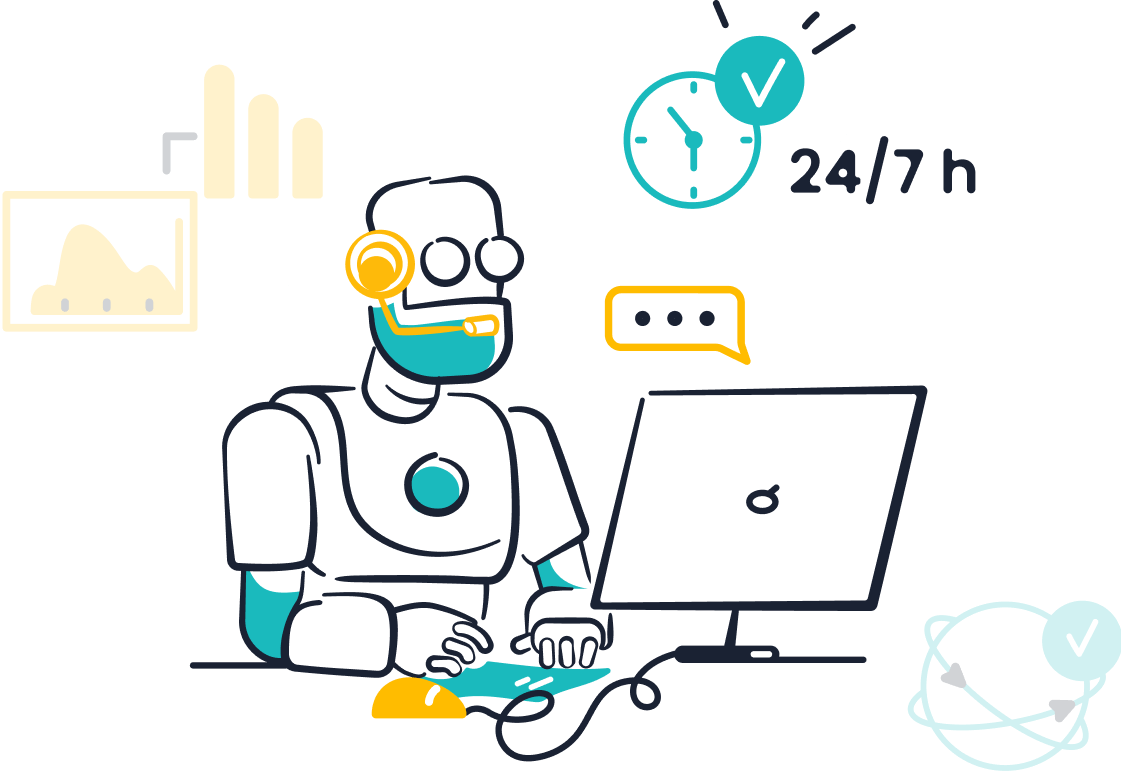
AI is reshaping how companies deliver personalized support in customer service and ecommerce. With AI-driven personalization, brands see up to a 15% revenue increase and a 37% reduction in response times. The table below shows recent statistics on the impact of personalized AI solutions:
| Metric / Case Study | Customer Engagement Impact | Efficiency Impact | Source |
|---|---|---|---|
| AI-powered personalization revenue increase | Up to 15% revenue growth | — | McKinsey |
| AI customer service response times | — | 37% faster first response | Gorgias, Callin.io |
| Sobot AI operational cost savings | — | Up to 68% reduction in staffing needs | Sobot |
| Repeat purchases via AI automation | 36% increase | — | Gorgias |
Sobot leads with innovation, enabling organizations to unlock new levels of personalized customer engagement and efficiency through its Sobot AI and Sobot call center solutions. Trust, measurable outcomes, and ethical AI guide every step toward more personalized, effective support.
AI and Personalized Support
Transforming Customer Experience
AI-driven personalization is changing how companies deliver personalized support in customer service and ecommerce. Businesses now use AI chatbots to automate routine inquiries, offering 24/7 instant support. This approach frees human agents to focus on complex tasks. Customers benefit from AI-enhanced self-service options, which allow them to solve problems on their own. Companies report a reduction in support tickets by 40% to 70%. Omnichannel and multilingual AI tools help brands engage customers across platforms and languages, creating seamless personalized experiences.
AI-driven personalization uses customer data to tailor recommendations and real-time interactions. Predictive analytics anticipate customer needs, enabling proactive support. These technologies lead to faster response times and higher customer satisfaction. For example, a telecommunications company reduced response times by 40% and increased customer satisfaction by 25% after adopting AI-powered support systems. AI also enables proactive problem resolution, detecting issues before customers report them. Companies see a 25% increase in customer satisfaction scores after implementing AI-driven personalized support. Spotify’s AI recommendation engine and Unity’s AI agents both show how personalized experiences boost engagement and retention.
Note: Salesforce reports that 88% of service leaders invest in AI for customer experience improvements, and Gartner predicts 80% adoption of generative AI in customer service by 2025.
Sobot’s Role in AI Support
Sobot stands out as a leader in delivering AI-driven personalization for businesses. The platform uses advanced natural language processing to help chatbots understand and respond to customers accurately. Machine learning algorithms improve chatbot performance over time, learning from each interaction. Sobot supports multiple languages, making personalized support accessible to a global audience.
| AI Technology Pillar | Description and Role in Personalized Support |
|---|---|
| Omnichannel AI | Integrates communication channels for consistent, personalized experiences across all touchpoints. |
| Scenario-Based AI | Delivers industry-specific personalization, especially for retail and ecommerce, with 24/7 support and tailored recommendations. |
| Multi-Faceted AI | Provides AI Agents for customers, AI Copilots for agents, and AI Insights for administrators to optimize personalized support. |
| Generative AI | Uses advanced language models to generate accurate, context-aware, and personalized responses. |
| Secure AI | Ensures data privacy and compliance, protecting customer information during personalized interactions. |
Sobot’s AI-driven personalization features include proactive engagement, sentiment analysis, and seamless integration with CRM systems. The platform allows smooth transitions between automated chatbots and live agents, ensuring customers always receive the right level of personalized support. Real-world results show that Sobot’s AI-powered support reduces first response times by up to 37% and increases customer satisfaction. For instance, the fashion retailer Motel Rocks saw a 43% reduction in support tickets and a 9.4% increase in customer satisfaction after using Sobot. Nearly 75% of business owners report improved customer experiences through instant AI support interactions with Sobot.
AI-Driven Personalization Strategies
Personalized learning and support have become essential for organizations aiming to deliver exceptional customer experiences. AI-driven personalization strategies help companies understand their customers, predict needs, and deliver relevant content at the right moment. These strategies use advanced segmentation and dynamic content delivery to create hyper-personalization, ensuring every interaction feels unique and valuable.
Advanced Segmentation
AI-driven personalization starts with advanced segmentation. Traditional segmentation divides customers into broad groups based on basic demographics. AI takes this further by identifying micro-segments—small, impactful groups that traditional methods often miss. These micro-segments allow for user-specific customization and hyper-personalization, making each customer feel understood.
AI analyzes large datasets from multiple sources, such as CRM records, website analytics, transaction logs, and social media sentiment. This analysis uncovers hidden patterns and predicts customer behaviors with high accuracy. For example, AI can group customers based on browsing history, purchase frequency, or even sentiment from support interactions. This approach leads to more precise targeting and better support outcomes.
| Data Source | What It Provides | How It Helps Segmentation |
|---|---|---|
| CRM Records | Demographics, purchase history, loyalty status | Baseline attributes for segment definitions |
| Website Analytics | Page views, session duration, product browsing paths | Behavioral signals for interest-based grouping |
| Transaction Logs | Items purchased, order frequency, average order value | RFM (Recency, Frequency, Monetary) scoring |
| Email Engagement Metrics | Opens, clicks, unsubscribe events | Engagement-based triggers and priority flags |
| Customer Support Interactions | Ticket categories, response times, satisfaction ratings | Sentiment analysis and pain-point identification |
| Social Media Sentiment | Brand mentions, review scores, comment themes | Emotional and opinion-based clustering |
| External Enrichment | Firmographics, geolocation, third-party affinity data | Adds depth for B2B and high-value consumer segmentation |
AI-driven segmentation uses these data sources to create detailed customer profiles. This process enables organizations to:
- Identify micro-segments that drive higher engagement.
- Anticipate customer needs by analyzing past behaviors.
- Automate personalization at scale for marketing campaigns and product recommendations.
- Continuously refine segmentation models to match evolving customer behaviors.
- Prioritize valuable segments, optimizing resource allocation and improving conversion rates.
Sobot’s AI-powered solutions excel in advanced segmentation. The platform integrates data from multiple channels, including chat, email, voice, and social media. Sobot’s AI agents analyze customer interactions in real time, uncovering new segments and enabling targeted AI use cases. For example, Sobot helps retail brands identify high-value customers who respond well to personalized offers, increasing conversion rates and customer loyalty.
Note: AI-driven segmentation relies on data quality and compliance. Organizations must ensure data accuracy and follow privacy regulations like GDPR and CCPA to maintain trust and deliver effective personalized learning strategies.
Dynamic Content Delivery
Dynamic content delivery is a core component of ai-driven personalization. AI uses machine learning to tailor content in real time, adapting to each customer’s preferences, behaviors, and context. This approach creates personalized experiences that boost engagement and satisfaction.
AI-powered chatbots, like those from Sobot, provide 24/7 support and deliver instant, personalized responses. These chatbots analyze customer queries, past interactions, and behavioral data to offer relevant solutions. For example, Sobot’s chatbot can recommend products based on browsing history or suggest help articles tailored to a customer’s recent activity. This level of user-specific customization increases the likelihood of conversion and enhances the overall experience.
The benefits of dynamic content delivery powered by AI include:
- 24/7 availability and reduced wait times for customers.
- Improved resolution rates through personalized support.
- Lower operational costs by automating routine tasks.
- Enhanced agent productivity, allowing human agents to focus on complex issues.
- Consistent and accurate information delivery across all channels.
- Multilingual support, enabling global reach.
- Scalability and adaptability to handle growing customer volumes.
AI-driven personalization strategies also enable real-time adaptation. AI can instantly adjust content and recommendations based on shifting customer behaviors. For example, if a customer abandons a shopping cart, AI can trigger a personalized email with a special offer. If a customer frequently asks about a specific product, AI can prioritize related content in future interactions.
| Organization | AI-Driven Personalization Outcome | Measurable Impact |
|---|---|---|
| Netflix | Personalized content recommendations to reduce churn | Saves ~$1 billion annually by reducing subscriber cancellations; 3-4x higher take-rate on personalized recommendations |
| Starbucks | AI-powered loyalty and marketing personalization | 30% increase in marketing ROI; 15% rise in customer engagement; targeted promotions based on customer data and context |
| Amazon | AI product recommendations across platforms | 35% of e-commerce revenue attributed to AI recommendations; increased basket size and conversion rates |
| Coca-Cola | AI-enhanced creative marketing campaigns | 10-30x faster creative iteration; 38% higher messaging resonance with audiences |
| McDonald's | Personalized drive-thru menus using AI | Increased average order value through relevant upsell suggestions; deployed in 12,000+ locations |
| Nike | Personalized emails and app content | 25% higher click-through rates on personalized emails; doubled digital sales over 3 years; improved customer retention |
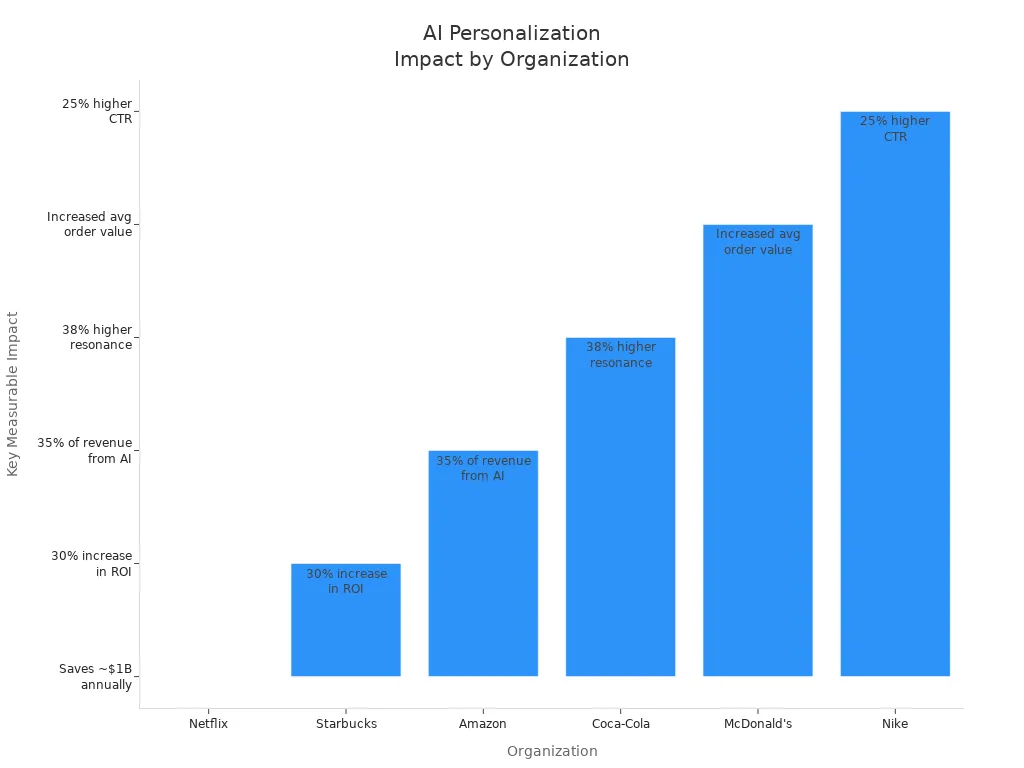
Dynamic content delivery impacts conversion rates and customer satisfaction. AI enables businesses to understand customer preferences deeply, allowing tailored recommendations and offers. Targeting customers with the right content at the right time improves engagement and conversion rates. AI analytics provide deeper insights into customer behavior, enabling data-driven decisions that improve personalization. Personalized marketing campaigns driven by AI increase brand loyalty and customer retention. For example, 60% of businesses report higher conversion rates and better customer retention through AI-driven personalized content.
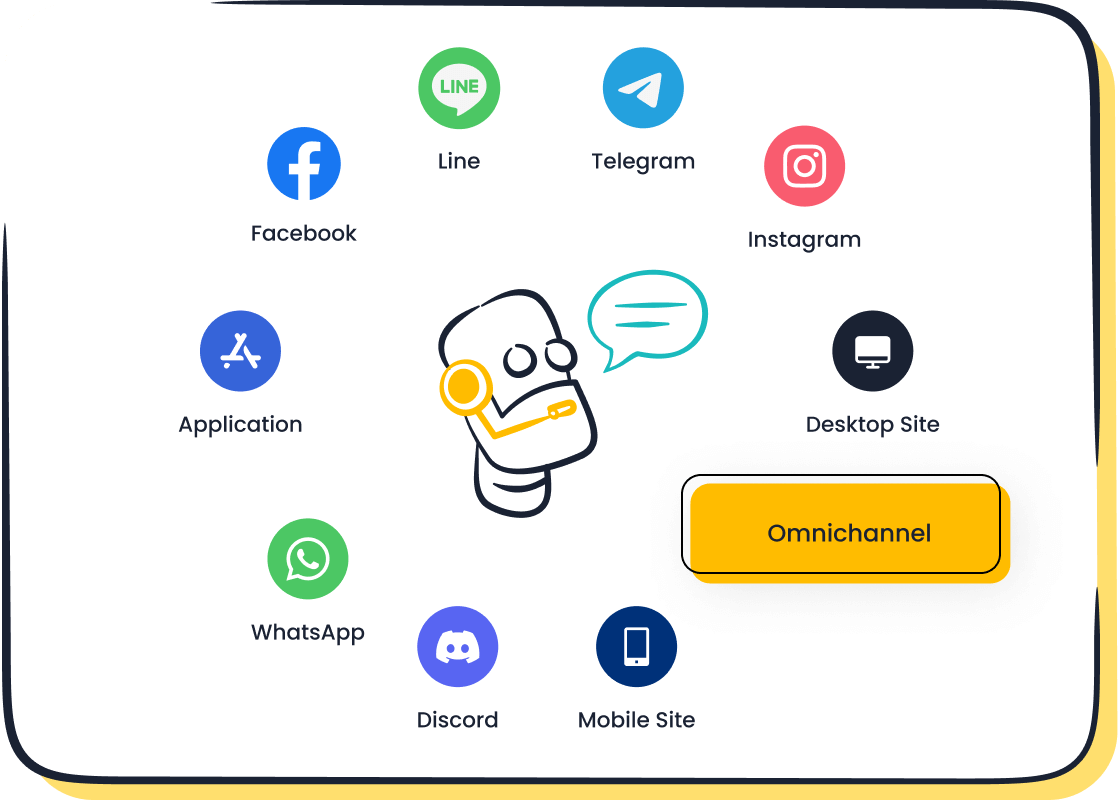
Sobot’s AI chatbot delivers dynamic content across multiple channels, including WhatsApp, SMS, and live chat. The chatbot uses predictive analytics to recommend products, answer questions, and guide customers through their journey. Sobot’s platform supports multilingual interactions, making it easy for global brands to deliver personalized learning strategies and hyper-personalization at scale.
Tip: Organizations should track key performance indicators such as engagement metrics, conversion rates, customer satisfaction, and retention to measure the success of ai-driven personalization strategies.
AI-driven personalization strategies, including advanced segmentation and dynamic content delivery, transform customer support and marketing. These applications drive measurable improvements in engagement, satisfaction, and business outcomes. Sobot’s solutions empower organizations to implement targeted AI use cases, deliver personalized learning, and achieve user-specific customization across every touchpoint.
Implementing Sobot Chatbot Solutions
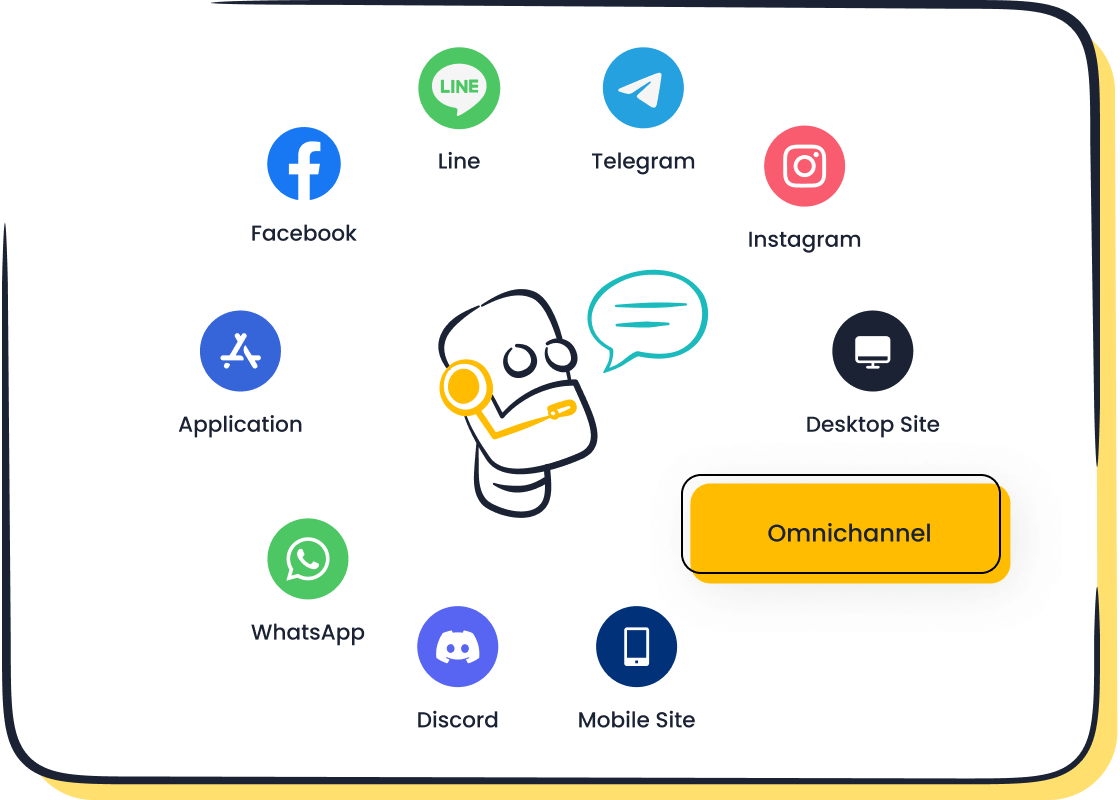
Omnichannel Integration
Sobot’s chatbot solutions deliver seamless integration across all major communication channels. Businesses can connect with customers through websites, mobile apps, social media, email, and SMS, ensuring every interaction remains consistent and personalized. This integration provides a centralized view of customer data, which helps agents deliver accurate and timely responses. Sobot’s system integration supports real-time updates, so customers never have to repeat themselves when switching channels.
Omnichannel integration also streamlines the customer journey. AI-driven insights from Sobot’s solutions enable predictive content delivery and accurate customer personas. This approach reduces waiting times and improves satisfaction. For example, OPPO used Sobot’s solutions to integrate multiple channels and internal CRM systems. The result was a 57% increase in repurchase rate and an 83% chatbot resolution rate. The integration of marketing and service channels allowed OPPO to overcome data fragmentation and enhance service quality.
Tip: Start with key channels like your website and app, then expand integration to social media and messaging platforms as customer preferences evolve.
| Benefit | Description |
|---|---|
| Centralized Data | Unified customer profiles for better support |
| Seamless Experience | Customers switch channels without losing context |
| Enhanced Personalization | AI tailors responses using integrated data |
| Improved Efficiency | Agents access complete histories, reducing response times |
Workflow Automation
Sobot’s chatbot solutions automate routine support tasks, freeing agents to focus on complex issues. The platform’s AI-powered workflows instantly respond to common inquiries, such as order status or product returns. Automation reduces human error and ensures consistent, accurate answers. Sobot’s no-code setup allows teams to design and deploy workflow automations quickly, supporting rapid system integration.
Workflow automation also lowers operational costs and boosts productivity. Sobot’s solutions can handle high inquiry volumes, especially during peak periods. OPPO’s experience shows that automating repetitive tasks with Sobot’s solutions increased operational efficiency and customer satisfaction. AI-driven routing logic ensures customers reach the right agent or receive instant self-service, reducing wait times.
Sobot’s focused solutions emphasize ethical AI, privacy, and transparency. Customers benefit from 24/7 support, multilingual capabilities, and empathetic interactions. These features, combined with robust system integration, make Sobot’s solutions a leader in customer engagement.
Personalized Learning with AI

Adaptive Support Systems
AI transforms personalized learning by creating adaptive support systems that respond to each user’s needs. These systems use adaptive learning technology to adjust content and support in real time. AI adapts coursework difficulty, identifies learning gaps, and recommends personalized content. This ensures every learner receives the right help at the right moment. Adaptive learning technology also creates personalized learning plans, guiding users through unique paths based on their progress and preferences.
AI-driven strategies in customer service and education include:
- Adjusting content difficulty for each learner.
- Identifying gaps and providing targeted recommendations.
- Delivering instant feedback through intelligent chatbots.
- Supporting accessibility with text-to-speech and translation tools.
- Enhancing student engagement with gamification and interactive applications.
Sobot’s AI-powered solutions use adaptive learning technology to deliver personalized support across channels. The platform’s chatbots provide real-time explanations and feedback, helping users solve problems quickly. Educators and support teams benefit from AI dashboards that show real-time performance, making it easier to intervene when needed.
The measurable benefits of adaptive support systems powered by AI appear in many industries. The table below highlights key outcomes:
| Measurable Benefit | Quantitative Outcome |
|---|---|
| Operating expense reduction | Up to 30% decrease |
| Agent productivity improvement | Around 40% increase |
| Ticket volume reduction | 43% decrease |
| Customer satisfaction increase | 9.44% rise |
| Average wait time reduction | 33 seconds less |
| Agent efficiency increase | 33% rise |
| Follow-up calls reduction | 20% decrease |
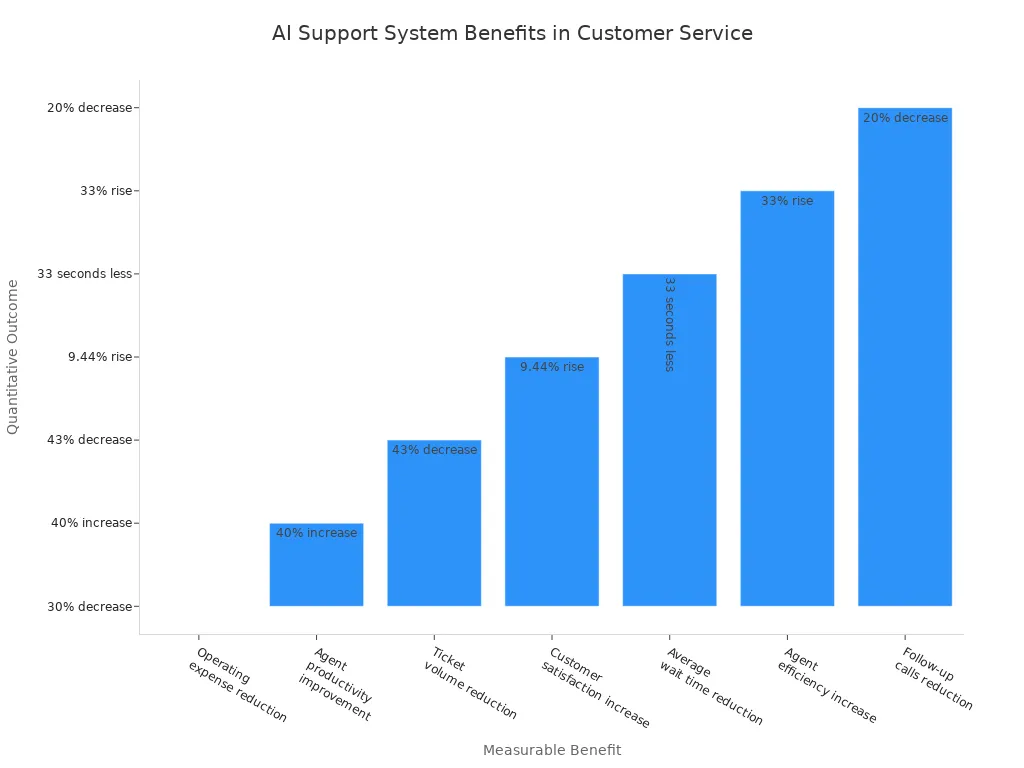
These results show that adaptive applications improve personalization, reduce costs, and boost satisfaction. AI-powered adaptive support systems help organizations deliver personalized learning at scale.
Real-Time Analytics
AI enables real-time analytics that drive effective personalized learning strategies. These analytics process large amounts of data instantly, identifying patterns and gaps that humans might miss. AI listens to conversations, understands context, and offers timely suggestions to agents. This reduces handle time and increases first contact resolution.
Key applications of real-time analytics in personalized learning include:
- Providing real-time agent assistance and suggestions.
- Forecasting demand and scheduling agents based on skills.
- Strengthening knowledge bases with context-relevant answers.
- Automating feedback collection and using sentiment analysis for actionable insights.
Sobot’s AI solutions use real-time analytics to optimize personalized learning plans and support. The platform rapidly analyzes customer interactions, enabling quick adjustments to strategies and applications. AI-driven analytics also enhance student engagement by delivering personalized recommendations and resolving queries instantly.
AI-powered real-time analytics support better decision-making and improve operational efficiency. Organizations can respond to customer needs faster, deliver adaptive support, and ensure every interaction feels personalized. These strategies help companies achieve higher satisfaction and loyalty through continuous personalization.
Data Privacy and Ethical AI
Building Trust
Organizations must address data privacy concerns to build trust in ai-powered support. Customers share sensitive information with ai agents, including emails, financial details, and health records. This level of data sharing raises several privacy challenges:
- ai agents require extensive personal data, increasing risks of unauthorized use.
- Personalized ai assistants handle highly sensitive information.
- Comprehensive data collection can lead to misrepresentation.
- Integration with task-performing assistants amplifies privacy concerns.
- Many industry leaders express unease about invasive data collection.
| Privacy Challenge | Description |
|---|---|
| Unauthorized Data Use | Data collected or used without user consent, leading to privacy violations, profiling, and identity theft. |
| Biometric Data Concerns | Permanent nature of biometric data (fingerprints, facial recognition) creates irreversible privacy risks. |
| Covert Data Collection | Hidden tracking methods like browser fingerprinting and cookies operate without user awareness or consent. |
| Algorithmic Bias and Discrimination | ai algorithms may perpetuate bias, causing unfair treatment and discrimination against certain groups. |
| Lack of Transparency and Consent | Users often unaware of how data is collected and used, eroding trust and complicating data governance. |
To foster trust, companies should follow these best practices:
- Communicate ai capabilities and limitations clearly. Customers need to know when they interact with ai and when a human agent can step in.
- Prioritize data privacy by using encryption and access controls. Always obtain informed consent before collecting data.
- Maintain human oversight. Train agents to work with ai and ensure seamless handoffs.
- Gather feedback on ai interactions and monitor satisfaction metrics. Use this data to improve ai performance.
- Personalize support using customer data, but avoid generic responses. Empower agents to deliver tailored experiences.
Sobot demonstrates these principles through transparent communication, robust security, and continuous improvement. The company’s ai solutions include clear opt-out options and strong encryption, supporting strategic ai adoption while protecting user privacy.
Note: Building trust in ai-powered support systems requires ongoing commitment to transparency, privacy, and ethical practices.
Compliance Standards
Ethical ai use depends on strict compliance with global standards. Organizations must meet legal, ethical, and sector-specific requirements to ensure responsible ai adoption. Key compliance frameworks include:
| Compliance Standard | Description |
|---|---|
| GDPR (General Data Protection Regulation) | Protects personal data and privacy for individuals in the European Union. Requires explicit consent and data minimization. |
| CCPA (California Consumer Privacy Act) | Grants California residents rights over their personal data, including access, deletion, and opt-out options. |
| HIPAA (Health Insurance Portability and Accountability Act) | Sets standards for protecting sensitive health information in the United States. |
| ISO/IEC 27001 | International standard for information security management systems. |
| SOC 2 | Framework for managing customer data based on five trust service principles: security, availability, processing integrity, confidentiality, and privacy. |
Sobot aligns its ai solutions with these standards, ensuring secure data handling and ethical ai practices. The company’s strategic ai adoption process includes regular audits, encrypted backups, and compliance with GDPR and CCPA. Sobot’s commitment to ethical ai adoption helps organizations build trust and meet regulatory requirements.
Tip: Regularly review compliance policies and update ai systems to reflect new regulations. This approach supports responsible ai adoption and protects both customers and organizations.
Measuring Success and Optimization
Key Metrics
Organizations measure the success of ai-powered support by tracking clear key performance indicators. These metrics help teams understand how well their solutions deliver value to both the business and the customer. Sobot’s analytics and reporting tools make it easy to monitor these KPIs in real time, giving leaders instant feedback and the ability to adjust strategies quickly.
| KPI Category | Relevant KPIs for AI-Driven Personalized Support |
|---|---|
| Operational Efficiency | Process times, error rates, automation levels |
| Customer Satisfaction | Response times, service quality, customer retention rates |
| Revenue Growth | New leads generated, upsell rates, contribution to sales |
Sobot’s platform aggregates data from multiple sources, ensuring accurate measurement of each KPI. Real-time monitoring and predictive analytics help teams forecast trends and anticipate changes in customer behavior. Advanced insights from ai reveal deep patterns, allowing organizations to improve personalization and engagement. Companies using Sobot’s solutions often see faster response times, higher customer satisfaction, and increased loyalty.
Continuous Improvement
Continuous improvement is essential for optimizing ai-powered support systems. Sobot’s solutions use automated quality assurance to analyze every customer interaction. The system provides agents with personalized feedback and coaching, helping them develop new skills and deliver better service. Automation of routine tasks reduces errors and frees agents to focus on complex customer needs.
Ai-driven analytics support data-driven decision making. Teams can identify inefficiencies, optimize workflows, and allocate resources more effectively. Sobot’s tools also enable proactive workload management by predicting peak demand and balancing ticket distribution. Real-time sentiment analysis ensures urgent issues get immediate attention, which boosts customer satisfaction.
Organizations that use Sobot’s analytics and reporting tools benefit from ongoing process optimization. Ai identifies bottlenecks and suggests improvements, supporting continuous learning and operational excellence. By integrating these solutions, businesses reduce costs, improve agent performance, and create a better experience for every customer.
Tip: Define clear objectives for ai initiatives and review performance regularly. Invest in training and cross-functional teams to maximize the impact of ai-powered solutions.
Organizations that embrace AI-driven personalized learning unlock powerful long-term benefits:
- Advanced decision-making through predictive insights.
- Enhanced efficiency as automation frees teams for creative work.
- Improved customer experience with 24/7 personalized support.
- Innovation and new revenue streams from market trend analysis.
- Agility to adapt quickly to change.
Sobot’s commitment to responsible AI adoption builds trust and drives business growth. The company uses explainable AI, strong governance, and transparent communication to support ethical personalized learning. Sobot’s solutions help organizations deliver personalized learning at scale, improve customer loyalty, and achieve sustainable success. Companies should assess their support strategies and explore Sobot’s AI-powered personalized learning solutions for future-ready, efficient, and ethical customer support.
Sobot empowers organizations to transform customer engagement through advanced personalized learning, AI, and personalization. Start your journey toward smarter, more effective support today.
FAQ
What is personalized support in customer service?
Personalized support uses AI to tailor responses and solutions for each customer. Companies like Sobot use customer data and chatbots to deliver relevant help. This approach increases satisfaction and loyalty. According to Salesforce, 84% of customers value being treated as a person, not a number.
How does Sobot’s AI chatbot improve efficiency?
Sobot’s AI chatbot automates routine tasks and answers common questions 24/7. This reduces agent workload by up to 70%. The chatbot also supports multiple languages, making personalized support accessible worldwide. Businesses see faster response times and lower costs with Sobot’s solution.
Is customer data safe when using AI-powered support?
Sobot follows strict data privacy standards, including GDPR and CCPA compliance. The platform uses encryption and regular audits to protect customer information. Customers can trust Sobot to deliver secure, ethical AI-powered personalized support.
Can Sobot’s chatbot integrate with other business systems?
Yes, Sobot’s chatbot connects with CRM, email, and social media platforms. This integration creates a seamless customer service experience. Agents access complete customer histories, which helps deliver accurate and personalized support across all channels.
What results do companies see after adopting Sobot’s AI solutions?
Companies using Sobot report up to 68% lower staffing needs and a 57% increase in repeat purchases. For example, OPPO achieved an 83% chatbot resolution rate and a 94% positive feedback rate. Sobot’s AI-driven personalized support delivers measurable business impact.
See Also
Improving Customer Support Efficiency With AI Software Tools
Transforming Customer Support Through AI Service Agents
Best AI Technologies For Enterprise Contact Center Success
